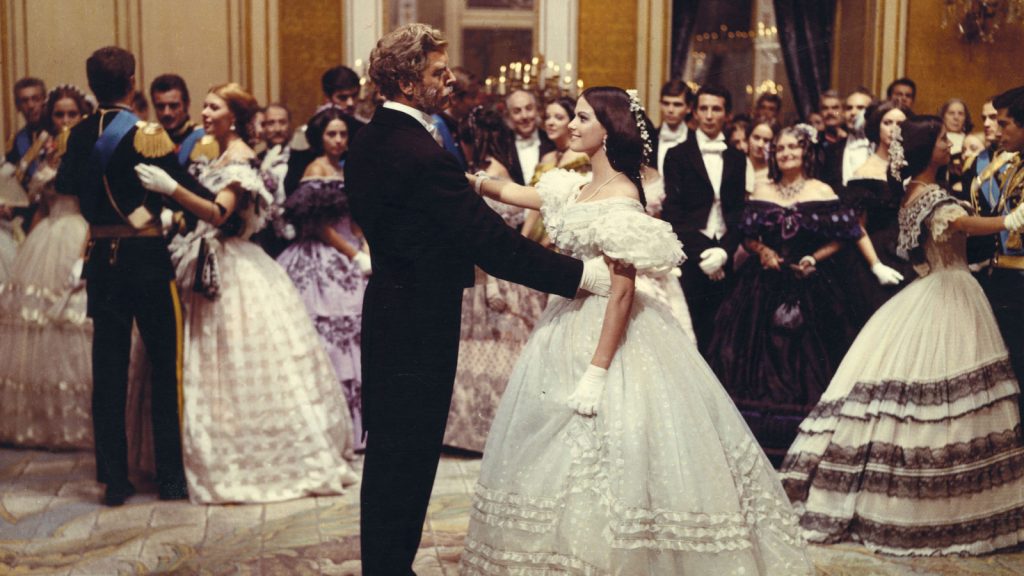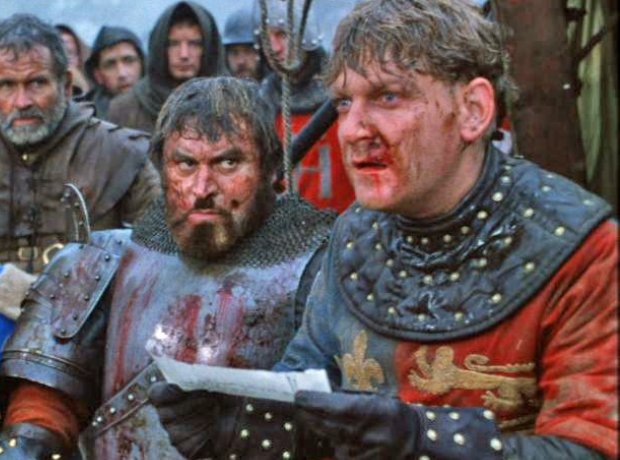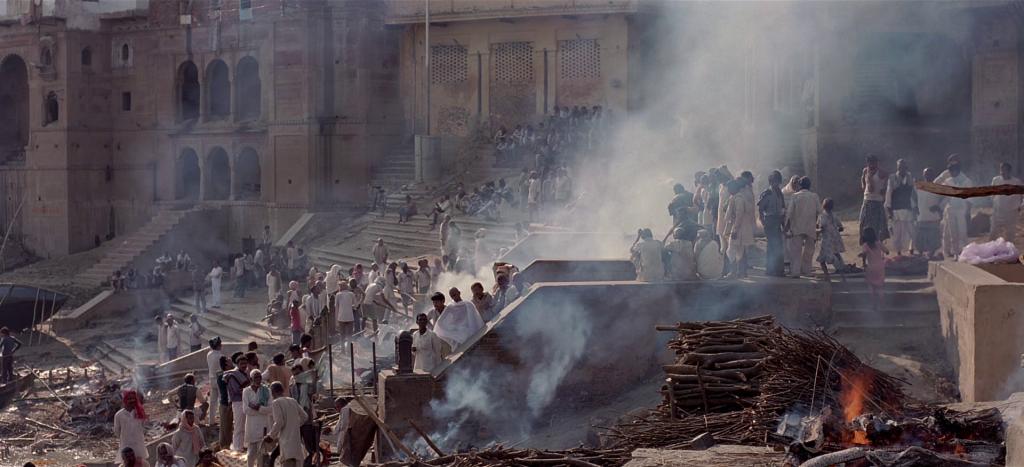Now in Audio Version!
Ten Great Films Against the Modern World, Part II
Posted By
John Morgan
On
In
Counter-Currents Radio,North American New Right
| Comments Disabled
Part 2 of 2 (Part 1 here [2])
To listen in a player, click here [3]. To download the mp3, right-click here [4] and choose “save link as” or “save target as.” To subscribe to the CC podcast RSS feed, click here [5].
6. Luchino Visconti, The Leopard (1963)
An adaptation of Giuseppe Tomasi di Lampedusa’s classic novel of the same name by one of the greatest Italian filmmakers, The Leopard is the chronicle of a Sicilian noble family during the time of the Risorgimento of the 1860s, which saw the unification of the various Italian states into the Kingdom of Italy. The family’s patriarch is Don Fabrizio Corbera, played by Burt Lancaster. The film shows the beauty of the old Italian aristocracy amidst a time of change, when the forces of modernity and liberalism were first beginning to make themselves felt in Italy. The most famous sequence in the film is a great ball held at the estate of a Sicilian prince, beautifully shot and conveying what the world of the aristocrats was like in a time that we moderns (or postmoderns?) can scarcely imagine, only knowing it through books and historical records. As Visconti was an aristocrat himself, he was uniquely prepared to film this story; and although he professed Leftist sympathies politically, in looking at the entire body of his work it’s clear that he remained very sympathetic to and nostalgic for the old European aristocracies.
While The Leopard doesn’t shy away from depicting the many social problems, most especially poverty, that were rife in Italy at the time, it’s impossible not to feel sadness over what has been lost – not just in Italy, but throughout Europe, given that those of us today know the horrors that awaited the West as it made the transition from monarchies and the churches to . . . whatever it is we have now. In the haunting last shot of the film, Don Fabrizio departs the ball and takes a quiet, solitary walk down a darkened street, symbolically highlighting the fact that the world he inhabits is rapidly becoming a thing of the past, heading into a dark and unknown future. As Rightists, we should not be excessively nostalgic for the past; such pining for a bygone age is a feature of conservatism rather than of the vital radical Right tradition, which embraces change. Nevertheless, we should never forget our past, and The Leopard is a moving testament to a world we have lost.
7. John Boorman, Zardoz (1974)
Despite starring Sean Connery and Charlotte Rampling, Zardoz is largely forgotten except by fans of cult science fiction; this is perhaps understandable given its cheesy costumes and lackluster special effects (at least by today’s standards). Nevertheless, I find it to be an extremely thought-provoking, if flawed, masterpiece. (David Yorkshire has also written about it [8].) Set in the twenty-third century, long after an unspecified apocalypse has destroyed the world as we know it, the Earth has been divided into three castes. There are the Brutals, who are little more than slaves who do the menial tasks; the Exterminators, an all-male clan (or Männerbund) of tribal warriors who are tasked with ruling over the Brutals and ruthlessly killing them when their numbers get too high, and who are subjected to selective breeding with Brutal women to improve their offspring; and the Eternals, who live within a self-contained, sealed-off realm called the Vortex and see themselves as the pinnacle of human evolution. The Eternals have achieved immortality and stopped their aging process at the point of young adulthood, have access to high technology and all human knowledge, and devote themselves to lives of leisure, beauty, and art. They also live by a strict code of conduct which one could call a sort of advanced Social Justice Warrior mentality (Boorman seems to have been parodying the hippie culture of the period); those who deviate from it are punished by being forcibly aged. Zed (Sean Connery), a Brutal, manages to sneak into the Vortex and confront the Eternals. What he discovers is that, ironically, wanting for nothing and living forever, the Eternals long for nothing but death, which they cannot achieve even through suicide because the same technology which grants them eternal life refuses to allow them to die. The Vortex is essentially the Western upper classes in the twenty-first century.
Zardoz is possibly the most Nietzschean film ever made, not even excepting 2001; the mass of humanity is looked down on as little more than animals, and the Eternals are portrayed as effete decadents who have come to loathe life even as they attain mastery over the material world. Much of their conversation could be imagined to be coming out of the mouths of today’s SJWs. Zed and his Brutal compatriots are the true heroes of the film – strong, warlike, virile, and completely amoral. Even though they were designed to be the Eternals’ servants, it turns out that they, in fact, are the true supermen, and have been created by Nature herself in order to destroy the Eternals as an offense against the natural order and take their place. One of the Eternals’ leaders, Consuella (Charlotte Rampling), is a cold scientist engaged in a lesbian partnership; but once Zed appears on the scene, she is initially fearful at the change he represents, but ultimately can’t resist him, and by the end of the film has taken her place as the mother of his children. Zardoz is one of the most reactionary films ever made; if you can look past the sight of Sean Connery in a loincloth, it’s well worth watching.
8. Harold Becker, Taps (1981)
Taps is very much a product of a different time; namely, the immediate post-Vietnam era, when the American military was subjected to ridicule for its failures in the previous war, people in the military were generally mocked for being dumb and behind the times, and it was being asked if traditional militarism itself and its attendant culture had been rendered obsolete by the rise of automated warfare. This, of course, was long before American liberals at both ends of the spectrum realized, post-9/11, that they could impose their own values on the American military and then use it to pursue all manner of liberal and neoliberal projects around the globe, and American soldiers became virtually sacrosanct as long as they toed the party line. Nevertheless, I still find Taps a very interesting and worthwhile film – and not only because I loved it as a kid. It is also notable for having featured Tom Cruise in his second film role, made before he became a superstar.
The film is set in an old, venerable (and fictional) American military academy called Bunker Hill which has supplied many of America’s wars with officers over the centuries. The Academy is commanded by retired Brigadier General Harlan Bache (George C. Scott), who ensures that all of the cadets are steeped in military tradition and traditional notions of honor and valor. He appoints Cadet Brian Moreland (Timothy Hutton), who worships the man, to Cadet Major, the highest-ranking Cadet; Cadet Captain David Shawn (Tom Cruise) commands the elite Red Berets at the Academy. Bache is told that the Academy is being sold to real estate developers, to be turned into condominiums; angered and humiliated, he opposes the plan but feels powerless to do anything about it. A graduation ball is held at the Academy, during which some young locals hanging around outside the gate scuffle with some of the cadets; Bache intervenes to put a stop to the fight, but his sidearm goes off accidentally, killing one of the locals. Shocked by what he has done, he has a heart attack and is hospitalized. Refusing to accept the Academy’s fate, Moreland does what he thinks Bache would want him to do and rallies the other cadets to make a stand; well-armed from the arsenal, and having secured supplies from the town, they turn the Academy into an armed camp, and refuse to surrender until the Academy’s fate is secured. The local police attempt to arrest the cadets but are daunted by their overwhelming firepower. The National Guard, complete with tanks, is called in, and Moreland finds himself facing their impending assault as well as the revolt of cadets in his own ranks as some of them begin to lose their nerve.
The story is a very straightforward account of tradition clashing with modernity. One could argue that in the end, Taps ends up being a negative critique of militarism; while this may be true, the cadets are generally shown in a favorable light, and the film nevertheless presents many compelling arguments for why the modern world’s triumph over traditional values is not a good thing. Also, quite honestly, I enjoy the spectacle of a group of military cadets taking control of their school and facing down the authorities.
9. Kenneth Branagh, Henry V (1989)
Shakespeare doesn’t exactly count as an anti-modern writer, but he was certainly effective at conveying the nature and values of the world before modernity’s advent. Anyone who treasures Western traditions and culture simply must appreciate the works of William Shakespeare, and Branagh’s Henry V – more so than any other cinematic Shakespeare adaptation, with the possible exception of Laurence Olivier’s Hamlet – brings Shakespeare to vigorous life no matter how horrible one’s experience with Shakespeare in school was. Branagh has made many great Shakespeare adaptations since, but in my opinion none surpasses this one. Branagh reminds us that Shakespeare was intended to be entertaining before any lofty literary or artistic considerations.
For those who aren’t familiar with the Shakespeare play, the story is about King Henry V’s campaign in Normandy as part of the Hundred Years’ War between the French and the English, culminating in the overwhelming English victory at the Battle of Agincourt. Henry V, as he depicted him, was Shakespeare’s ideal monarch, simultaneously a man of the people, a staunch defender of his country who was not easily intimidated, a leader who could summon fierce loyalty in his followers, and a valiant warrior. Branagh’s performance as Henry in the film is simply stunning; he conveys the character in his full complexity – occasionally experiencing doubt, but always remaining steadfast when his people are at stake. And even though the play is a classic work of English nationalism, and Shakespeare didn’t attempt to hide his biases, the French still come across as human and sympathetic, if rather arrogant. Branagh also doesn’t hesitate to convey the carnage of warfare alongside the glory. In short, Branagh’s Henry V is a triumph of acting and dramatization, and a great meditation on the problems inherent in diplomacy, war, nationalism, and leadership.
10. Ron Fricke, Baraka (1992)
Baraka – the name is an Islamic term for “blessings” – may not be to everyone’s tastes, as it is basically to film what World Music is to music, but it will appeal to the more Traditionalist (in the Guénonian/Evolian sense) types. When telling newcomers about it, I’ve sometimes described it as Guénon’s Crisis of the Modern World on film. Unlike the others I’ve listed, it’s not a narrative film, but not quite a documentary, either. There is not a single word of text or dialogue in its entire length – only music (but what glorious music it is!). Instead, the viewer is presented with a sequence of images – filmed entirely during the year 1991 – from every corner of the globe, strongly focusing on either religion, traditional folkways and the remnants of traditional civilizations, or the insanity of the modern world in comparison to the previous elements. Each of the world’s major traditional religions gets screen time, and the modern world definitely comes off as something insane, unbalanced, and evil in comparison. And the scenes filmed at Varanasi on the Ganges – a place I have been to myself – capture the spirit of India better than anything else I’ve seen on film.
Given the lack of any sort of typical narrative, the film is wide open to interpretation, but after viewing it many times I believe there is a structure of sorts, allegorically representing the stages of a human life, and ending in life beyond death through a connection to the transcendent. I have no idea what the filmmakers’ intentions were, nor do I care, but I definitely think Baraka can be read in a Traditionalist manner, highlighting the superiority of cultures rooted in their traditions and in the spiritual, which are valuable in their uniqueness, as opposed to the artificial hodgepodge we call “multiculturalism.” And there certainly can be no question that the modern world is presented as something to be overcome or rejected. On top of which, it conveys a sense of the vast yet ineffable mystery which lies at the heart of all religions, which all civilizations have struggled to express through their religions, culture, and science. Baraka is a film I rewatch when I want to be reminded that what we are fighting for truly is what is right – not just for our people, but for all the peoples of the Earth.





